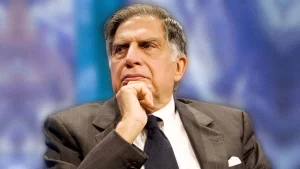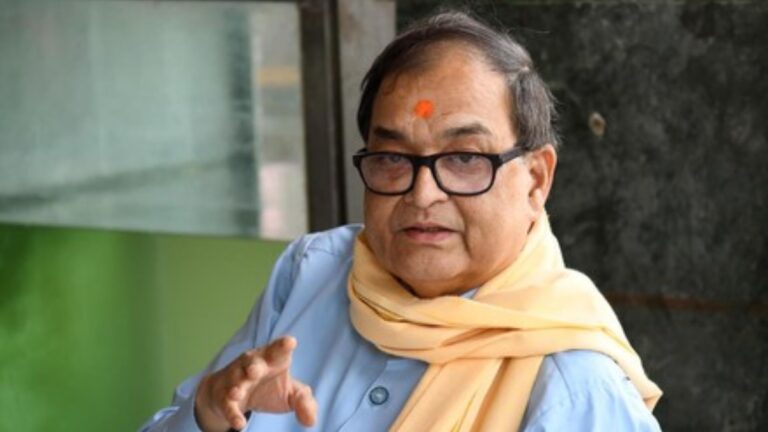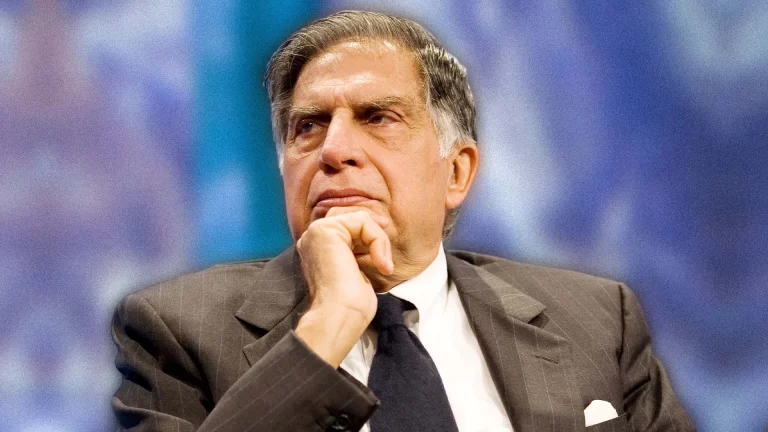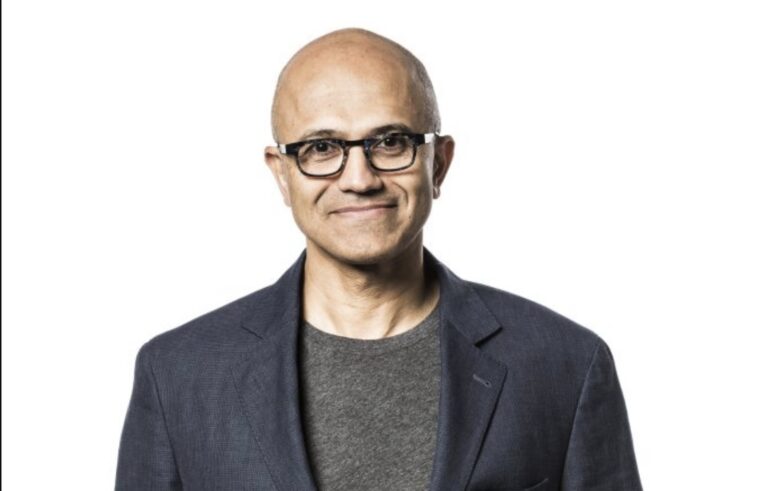Ratan Naval Tata, the former chairman of the Tata Group, is a name synonymous with Indian business and philanthropy. During his tenure as chairman, he led the conglomerate to new heights, significantly growing its global footprint. His tenure was marked by remarkable growth, a strategic approach to acquisitions, diversification, and a steadfast commitment to ethical business practices and social responsibility. Ratan Tata’s visionary leadership has left an indelible mark not only on the Tata Group but also on Indian industry and society at large.
Early Life and Education
Born on December 28, 1937, in Bombay (now Mumbai), Ratan Tata is the great-grandson of Jamsetji Tata, the founder of the Tata Group. Despite his illustrious lineage, Ratan’s early life was not without challenges. His parents separated when he was young, and he was raised by his grandmother.
Ratan Tata’s academic journey took him across the globe. After completing his early schooling in India, he attended the prestigious Bishop Cotton Boys’ School in Shimla and the Cathedral and John Connon School in Mumbai. His exposure to different cultures broadened his perspective, and he eventually chose to pursue a degree in architecture at Cornell University in the United States. His interest in architecture reflected his creative and innovative thinking, which would later influence his business strategies.
Transition to Engineering
After completing his architecture degree, Ratan Tata joined Harvard Business School for an advanced management program, but family responsibilities brought him back to India. He joined the Tata Group in 1962, initially working in Tata Steel’s foundry. This marked the beginning of his association with the Tata Group, one that would last for decades and change the face of Indian industry.
Joining the Tata Group
Upon his return to India, Ratan Tata began his career in the Tata Iron and Steel Company (TISCO), now known as Tata Steel, as a blue-collar worker. His willingness to start at the grassroots level demonstrated his humility and commitment to understanding the intricacies of the business. This experience in the foundry instilled in him a deep respect for hard work and the labor force, which would later shape his leadership style and his policies.
Through the years, he held various roles in different Tata Group companies, gaining a comprehensive understanding of the conglomerate’s operations. His early roles allowed him to understand the challenges faced by the industry, especially in terms of modernization and global competitiveness.
Rise to the Chairmanship
Ratan Tata was appointed as the chairman of the Tata Group in 1991, succeeding his uncle, J.R.D. Tata. His appointment came at a time when India was undergoing a significant economic transformation, marked by liberalization and globalization. Recognizing the need to adapt to the changing environment, Tata embarked on a transformative journey that would shape the future of the Tata Group.
One of the first steps he took as chairman was restructuring the Tata Group. At the time, the conglomerate consisted of over 300 companies, many of which were not contributing to the Group’s overall profitability. Tata consolidated these businesses, focusing on key sectors with growth potential. He also emphasized a strong corporate governance framework to ensure transparency and accountability within the Group.
Strategic Acquisitions and Diversification
Under Ratan Tata’s leadership, the Tata Group diversified its portfolio and entered several new industries, including telecommunications, retail, and automobiles. His strategic vision saw the Group expand its presence in the global market through acquisitions and partnerships.
Tata Motors and the Acquisition of Jaguar Land Rover
In 2008, Tata Motors, under Ratan Tata’s guidance, acquired the British luxury car brands Jaguar and Land Rover (JLR). This acquisition marked a turning point for Tata Motors, catapulting it onto the global stage and enhancing its reputation as an international player in the automotive industry. Despite skepticism from industry experts, Tata’s decision proved to be a masterstroke. JLR has since become a major contributor to Tata Motors’ revenue, and the acquisition is considered one of the most successful examples of Indian companies expanding internationally.
Tata Steel’s Acquisition of Corus Group
Another notable achievement was Tata Steel’s acquisition of the Anglo-Dutch steelmaker Corus Group in 2007. At the time, it was the largest acquisition by an Indian company in the global steel industry, making Tata Steel one of the world’s top steel producers. This acquisition was part of Tata’s strategy to expand the Group’s footprint in Europe and other international markets, ensuring that Tata Steel could compete on a global scale.
Tata Consultancy Services: Pioneering IT Services
Ratan Tata also played a key role in the growth of Tata Consultancy Services (TCS), which has become one of the world’s leading IT services providers. Recognizing the potential of the IT industry early on, Tata invested in TCS and helped it expand its global operations. Today, TCS is a major player in the global IT sector, contributing significantly to the Tata Group’s revenues.
Social Responsibility and Philanthropy
Ratan Tata’s commitment to social responsibility is deeply ingrained in the Tata Group’s ethos. He has championed numerous initiatives aimed at improving the lives of underprivileged communities, reflecting his belief that businesses have a responsibility to contribute positively to society.
Tata Trusts
The Tata Trusts, which own a significant portion of Tata Sons, are among the oldest and most respected philanthropic organizations in India. Under Ratan Tata’s leadership, these trusts have supported a wide range of initiatives in areas such as education, healthcare, and rural development. The Trusts have also contributed to disaster relief efforts and supported initiatives aimed at improving water and sanitation facilities in rural areas.
Healthcare Initiatives
Ratan Tata has been a strong advocate for healthcare initiatives, with significant contributions to institutions like the Tata Memorial Hospital and the establishment of the Nanavati Hospital in Mumbai. His efforts in healthcare have had a lasting impact on the well-being of countless individuals, particularly in underserved communities.
Tata Institute of Social Sciences (TISS)
TISS is another example of Tata’s commitment to social development. Founded by the Tata Group, TISS has become a premier institution for social work and research in India. It has played a crucial role in training social workers and conducting research on issues affecting marginalized communities.
Leadership Philosophy
Ratan Tata’s leadership philosophy is characterized by a blend of ethics, innovation, and a commitment to social responsibility. His approach has been instrumental in shaping the Tata Group’s culture and values. Read more on Lessons from Ratan Tata’s Legacy.
Emphasis on Ethical Business Practices
Throughout his career, Tata has emphasized the importance of conducting business ethically. He believed that companies should prioritize integrity and transparency, even if it means sacrificing short-term profits. His focus on ethical business practices has earned the Tata Group a reputation for trustworthiness and reliability.
Innovation and Entrepreneurship
Ratan Tata has always encouraged innovation and entrepreneurship within the Tata Group. He believed that fostering a culture of creativity and risk-taking was essential for staying competitive in a rapidly changing global market. His support for projects like the Tata Nano, an affordable car aimed at the masses, exemplifies his commitment to innovation and social impact.
Commitment to Social Impact
Tata’s belief in the importance of social impact is reflected in his philanthropic initiatives. He has often stated that businesses should play a role in addressing societal challenges and improving the lives of people. This philosophy has guided the Tata Group’s approach to corporate social responsibility, making it a leader in the field.
Retirement and Legacy
Ratan Tata retired as chairman of the Tata Group in December 2012, but his influence continues to shape the conglomerate. His contributions to Indian industry and society have earned him numerous awards and accolades, including the Padma Bhushan and Padma Vibhushan, two of India’s highest civilian honors.
Despite his retirement, Tata remains actively involved in philanthropic activities and continues to inspire future generations of business leaders. His legacy is one of visionary leadership, ethical business practices, and a deep commitment to social responsibility.
Inspiring Quotes by Ratan Tata
Ratan Tata’s words of wisdom have resonated with millions across the globe, embodying his philosophy on life, leadership, and social responsibility. Here are some of his most famous quotes that reflect his core values and approach:
“I don’t believe in taking right decisions. I take decisions and then make them right.”
This quote speaks to Tata’s belief in the importance of commitment and perseverance, highlighting his confidence in facing uncertainty and his resolve to make the best of every situation.
“Ups and downs in life are very important to keep us going, because a straight line even in an ECG means we are not alive.”
Ratan Tata underscores the value of resilience and reminds us that life’s challenges are essential for growth, as they make life meaningful and dynamic.
“If you want to walk fast, walk alone. But if you want to walk far, walk together.”
Tata emphasizes the power of teamwork and the significance of collaboration for achieving sustained success.
“None can destroy iron, but its own rust can. Likewise, none can destroy a person, but their own mindset can.”
With this metaphor, he highlights the impact of mindset on personal success, stressing the importance of self-belief and a positive outlook.
“I may have hurt some people along the way, but I would like to be remembered as someone who made a difference.”
Ratan Tata’s humility and desire to leave a lasting legacy of positive impact are evident in his hope to be remembered for making a difference.
“Take the stones people throw at you and use them to build a monument.”
This quote encourages turning adversity into opportunity, a testament to Tata’s resilience and determination.
“Businesses need to go beyond the interest of their companies to the communities they serve.”
Reflecting his belief in corporate social responsibility, Tata advocates for companies to contribute meaningfully to the society they operate within, beyond mere profit-making.
“Power and wealth are not two of my main stakes.”
This speaks to his values-driven leadership style, focusing on purpose and ethics over material success.
“I admire people who are very successful. But if that success has been achieved through too much ruthlessness, then I may admire that person less.”
Ratan Tata values ethical success, showing his distaste for ruthless approaches to business, regardless of the financial outcomes.
These quotes reflect Tata’s deep-seated principles and his belief in the importance of ethics, resilience, and social impact. They continue to inspire and motivate entrepreneurs, business leaders, and individuals around the world to strive for success with integrity.
Conclusion
Ratan Tata’s life and career are a testament to the power of visionary leadership, ethical business practices, and a commitment to social responsibility. His contributions have not only transformed the Tata Group into a global powerhouse but have also made a significant impact on Indian society. As a business leader and philanthropist, Ratan Tata has left an indelible mark on the world, and his legacy will continue to inspire generations to come.











